Hail Damage Roof Claims in Georgia: A Guide for Property Owners
October , 2023 | 8 min. read
By Mitch Owens
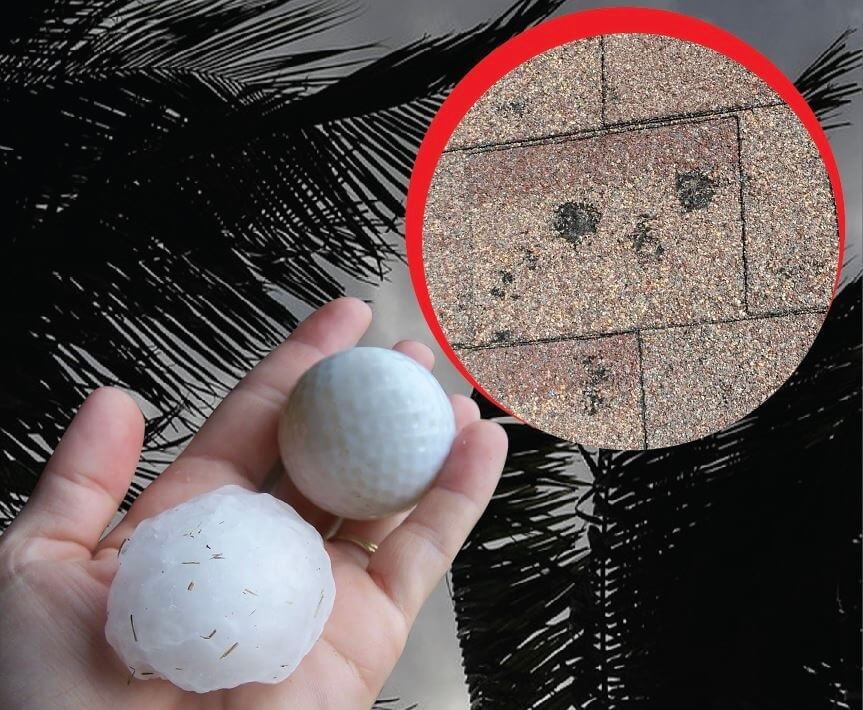
As a homeowner in Georgia, are you disquieted by the recent hailstorm and the potential havoc it might wreak on your rooftop? At RoofCrafters, we empathize with the anxiety that arises when grappling with the aftermath of a hailstorm.
And with 3 decades of experience in the field as a family-owned business. We've seen the destruction hail can inflict on your property. Untreated hail damage may result in leaks, wood decay, and mildew. To ease your concerns, we have compiled this guide.
In this guide, we will delve into all aspects of hail damage in Georgia, covering the following in detail:
- Identifying hail damage
- Remedying hail damage
- Filing an insurance claim for hail damage in Georgia
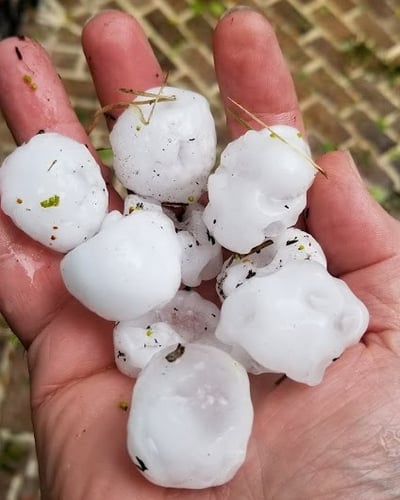
Whether you have recently grappled with hail damage. Or you want to be better equipped for hail damage restoration and insurance claim procedures in Georgia. We're here to help educate you and hopefully, we can provide you with a better understanding of the process.
Let us dive right in.
Detecting Hail Damage on a Georgia Rooftop
Georgia homeowners need to be adept at discerning hail damage to their rooftops. This skill enables you to adopt requisite measures to avert further destruction. And only file an insurance claim when needed. In this segment, we'll explore two methods for detecting hail damage on your rooftop:
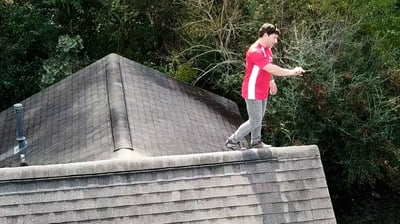
- Visually inspecting your roof
- Identifying indicators of hail damage
Visual Inspection Approaches
A visual examination is one method to ascertain hail damage on your rooftop. Below are the steps for executing this inspection in Georgia:
- Survey your property: Look for dented soft metal, and any other signs of damage to your gutters, siding, or other exterior surfaces in Georgia.
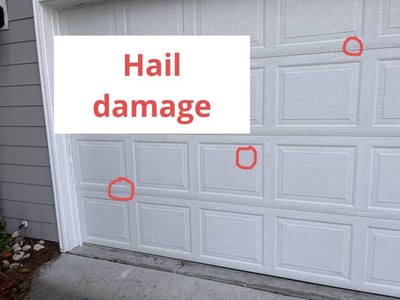
- Examine granule loss: Hail can dislodge the protective granules on your shingles. Search for excessive granule loss in your gutters, driveways, or around your home's base.
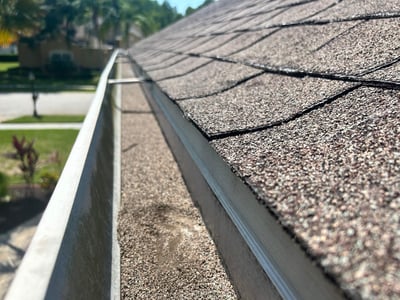
- Inspect the roof edge: Hail can induce cracks or punctures on your shingles or other roofing materials. Scrutinize your roof along the edge for any indications of cracking or puncturing.
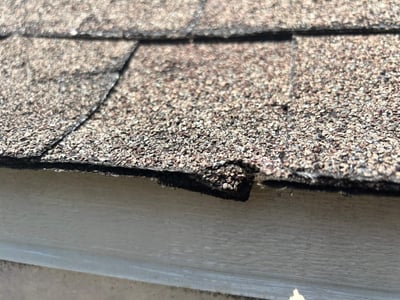
Indicators of Hail Damage to Your Georgia Home
In addition to visual examination, here are some indicators of hail damage to watch for in Georgia:
- Dented gutters or downspouts
- Bruised shingles
- Cracked or missing tiles
Bear in mind that hail damage may not always be discernible to the untrained observer. It's important to have your rooftop inspected by an experienced Georgia roofer if you suspect damage.
Hail Damage Appearances on a Georgia Rooftop
Hail damage on a rooftop can span from subtle to severe, and understanding what to look for when evaluating the damage is essential. In this section, we'll discuss some common types of hail damage. We'll also show examples of hail damage on various roofing materials in Georgia.
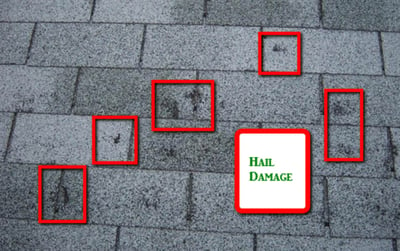
Prevalent Types of Hail Damage
The most serious types of hail damage on a Georgia rooftop encompass:
- Bruises: Bruises happen when hail collides with the shingle without fracturing the mat. They might not be discernible but can cause damage over time.
- Cracks: Cracks are conspicuous tears in the shingle that arise when the mat is torn by the force of the hail.
- Holes: Holes materialize when hail strikes the shingle and fractures both the mat and the granule surface. They are visible and can wreak considerable havoc on the roof.
Illustrations of Hail Damage on Diverse Roofing Materials in Georgia
Various roofing materials can experience distinct types of hail damage. Here are some examples in Georgia:
- Asphalt shingles: Hail impacts to asphalt shingles may manifest as circular dents, or as extensive splits or tears in the shingles.
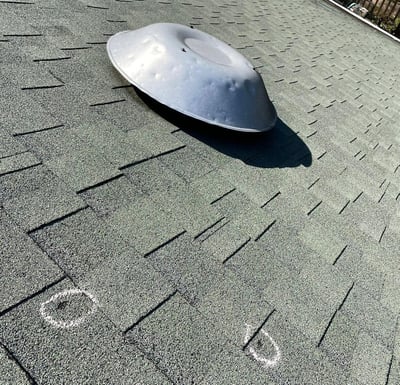
- Metal roofs: Hail damage to metal roofs may present as indentations or dimples, or in more severe cases, as punctures or rips in the metal.
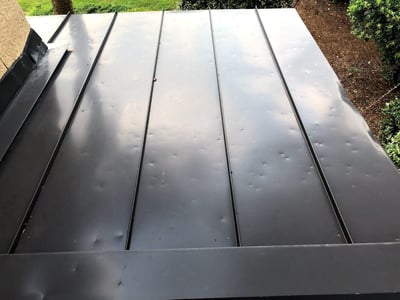
- Clay or concrete tiles: Hail damage to clay or concrete tiles can appear as fractures or chips on the tile surface. Tiles may also break into pieces.
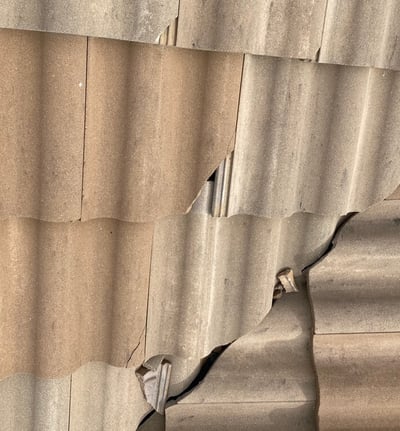
Understanding how hail damages roofs enables you to better identify the damage. You can then take appropriate action to remedy the damage.
Mending Hail Damage on a Georgia Rooftop
Hail damage on a rooftop can evolve into a grave issue if neglected in Georgia. It can precipitate leaks, wood decay, and mold. Hence, addressing the damage promptly is crucial. In this segment, we'll discuss the types of repairs that might be necessary.
Types of Hail Damage Repairs That May Be Essential
The severity of the hail damage dictates the necessary repairs in Georgia. For minor damage, such as small dents or cracks, straightforward repairs may suffice. This can involve replacing dented metal vents or cracked shingles. Yet, for extensive damage, such as significant impacts or missing shingles, a roof replacement may be needed.
DIY vs. Professional Repairs
Thinking about repairing hail damage on your Georgia rooftop yourself? You might be uncertain whether to attempt the repairs or hire a professional. While DIY repairs may appear cost-effective, it is crucial to weigh the potential risks and drawbacks.
For instance, improperly executed repairs could exacerbate damage and inflate repair costs in the long run. Engaging a professional in Georgia may be a safer and more dependable option. They'll have the expertise and tools to repair the damage.
Filing an Insurance Claim in Georgia for Hail Damage
In the event of suspected hail damage to your Georgia rooftop, promptly file an insurance claim. Follow these steps when filing a claim:
- Contact a local roofer: Call a local roofing company and have them come out and inspect your roof. They'll also inspect your property for any collateral damage. (gutters and downspouts, windows, garage doors, etc) You don't want to file a claim if you don't have enough damage to meet or exceed your deductible.
- Contact your insurance company: Call your insurance company to report the hail damage and begin the claims process. They will likely ask for information about the damage, the date of the storm, and your policy number.
- Document the damage: Take photos and videos of the hail damage to your roof, and any other areas of your property that were affected. This will help support your claim and can be used as evidence during the claims process.
- Review your policy: Familiarize yourself with the terms and conditions of your insurance policy. Learn your deductibles or co-payments that may apply.
- Meet with an adjuster: Your insurance company will likely send an adjuster to inspect the damage and assess the cost of repairs. Be sure to ask questions and provide any additional documentation or estimates that you may have.
- Negotiate your settlement: If the insurance company offers a settlement that you feel is too low. Consider hiring a public adjuster and an attorney to help you with the settlement process.
Related Article: Do I Need to Provide 3 Roof Estimates to My Insurance Company?
Weathering the Storm: Overcoming Hail Damage and Safeguarding Your Georgia Home
In the face of adversity, when nature's wrath descends upon your beloved home, it is essential to remain steadfast and well-informed.
Navigating the complex landscape of insurance claims and contractor selection is challenging. Your commitment to providing good information. And then making informed decisions will ensure successful repairs get done on time.
Together, we can rise above the challenge that hail damage presents. Fortifying our homes and safeguarding our families. The journey to restoration may be filled with trials. But with the support of our family at RoofCrafters, we can triumph over adversity and emerge stronger than ever.
My name is Mitch, and I have over 10 years of roofing experience. I enjoy my career in the service industry because I love helping others take care of their homes and businesses. With over 10 years in the roofing industry, my success comes from my honesty and integrity during my roof inspections. I do my best to listen to the needs of my clients and strive to provide an awesome client experience.



